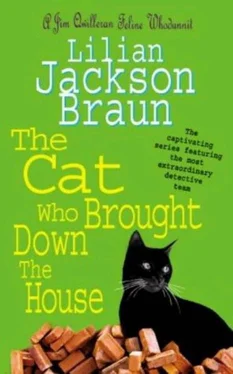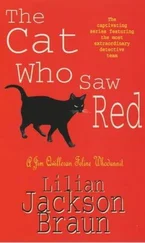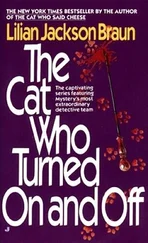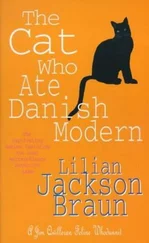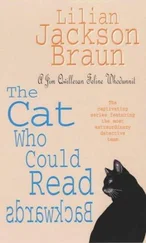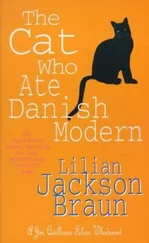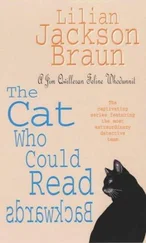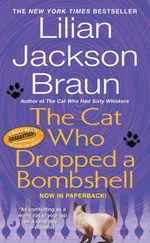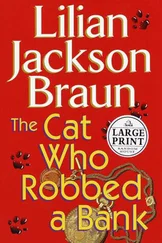Lilian Braun - The Cat Who Brought Down the House
Здесь есть возможность читать онлайн «Lilian Braun - The Cat Who Brought Down the House» весь текст электронной книги совершенно бесплатно (целиком полную версию без сокращений). В некоторых случаях можно слушать аудио, скачать через торрент в формате fb2 и присутствует краткое содержание. Год выпуска: 2003, ISBN: 2003, Издательство: Jove, Жанр: Старинная литература, на английском языке. Описание произведения, (предисловие) а так же отзывы посетителей доступны на портале библиотеки ЛибКат.
- Название:The Cat Who Brought Down the House
- Автор:
- Издательство:Jove
- Жанр:
- Год:2003
- ISBN:9780515136555
- Рейтинг книги:4 / 5. Голосов: 1
-
Избранное:Добавить в избранное
- Отзывы:
-
Ваша оценка:
- 80
- 1
- 2
- 3
- 4
- 5
The Cat Who Brought Down the House: краткое содержание, описание и аннотация
Предлагаем к чтению аннотацию, описание, краткое содержание или предисловие (зависит от того, что написал сам автор книги «The Cat Who Brought Down the House»). Если вы не нашли необходимую информацию о книге — напишите в комментариях, мы постараемся отыскать её.
The Cat Who Brought Down the House — читать онлайн бесплатно полную книгу (весь текст) целиком
Ниже представлен текст книги, разбитый по страницам. Система сохранения места последней прочитанной страницы, позволяет с удобством читать онлайн бесплатно книгу «The Cat Who Brought Down the House», без необходимости каждый раз заново искать на чём Вы остановились. Поставьте закладку, и сможете в любой момент перейти на страницу, на которой закончили чтение.
Интервал:
Закладка:
“I know she’s the new "A" in HBB&A. We’ve met briefly,”
“The realtor recommended her to handle legal details of the property transfer.. Also, Thelma will have to file a new will in this state... Mavis thinks the residents of Pleasant Street should give a reception to welcome Thelma.”
“Friendly idea,” Qwilleran said. “Since half the families on the street are Scottish, you could hold it at the Scottish lodge hall.”
Fran gave him a sly glance. “We hoped you’d let us use your barn.”
“Hmmm,” he mused. “That’s something to think about!”
“Think fast. It’s to be a week from Sunday. Robin-O'Dell will do the catering, and Burgess Campbell will take care of expenses. The Scots will be in Highland attire, which makes for a gala mood.”
“Well... since you’re working on a short deadline... I'll say yes.” Qwilleran liked any excuse to wear his Highland kit.
“Everyone will be delighted, and Thelma will be terribly impressed.” Fran was putting on her shoes.
“Before you leave, let me bring in Yum Yum,” Qwilleran said. “You two rational females should bury the hatchet”
“No, no! She’ll nip my nylons even if she doesn’t break my foot!”
He accompanied her to the barnyard and noted that she driving a new car—a luxury model. The Thackeray assignment must have been lucrative.
Before stepping into the car, she hesitated and then said, “As a favor to me, Qwill, would you let me supply an artwork to hang over your fireplace, replacing the bookshelves, just temporarily? Thelma knows I did the interior of the barn, and I want it to look its best.”
“I'll take it under advisement,” he said gravely. He felt about his books the way parents feel about their children.
When he brought them in from the gazebo and watched Koko gobbling his dinner and Yum Yum nibbling daintily, he thought, How could this sweet little creature be accused of nipping nylons?
Later, he asked Polly on the phone, “Does Catta ever nip women’s nylons?”
“No. Why do you ask?”
“I've heard that some female cats have a nylon fetish.”
He was careful not to mention Fran’s visit. Polly disliked her flip manner and such gaucheries as kicking off her shoes when offered a second drink. Polly called the gesture ‘just too cute.’
So Qwilleran told her only that the pleasant people on Pleasant Street wanted to borrow the barn for a reception welcoming Thelma. “It’ll be a week from Sunday. Highland dress is suggested, since half the residents are Scots.”
“Lovely!” she said. “Am I invited? I'll wear my clan sash, pinned on the shoulder with a cairngorm.”
“You’re not only invited; you’re in charge of background music—preferably light classics that make people feel good but aren’t too boringly familiar.”
“I have just the thing! The piano pieces of Sibelius. They’ll be thrilling on your stereo system.”
Then he told her he was thinking of removing the books over the fireplace and replacing them with artwork.
She approved. “I've always thought that was a risky place for book bindings. The heat could dry them out, you know. You might find a suitable wall hanging at the Art Center Sunday.”
Having Polly in accord with his two forthcoming projects, he tackled the preparations with a modicum of enthusiasm.
Qwilleran was inept at household maintenance chores. He worked with words and believed that carpenters should work with hammers, plumbers with wrenches, and painters with brushes. Whenever he had attempted a simple do-it-yourself project, the Siamese sensed the gravity of the occasion and watched with apprehension. He said to them, “Keep your toes crossed and if I fall off the ladder, call 911.”
The job called for removing the books, the shelving, the brackets that held the shelves, and the metal strips that supported the brackets, leaving several large screw-holes in the wall. He seemed to remember that such holes could be filled with toothpaste, but the wall was white, and his current toothpaste was green. The obvious solution was to buy a wall hanging large enough to cover the blemishes. It would require an artwork at least five feet wide and three feet high.
Chapter 5
In the late nineteenth century the octagonal apple barn had presided over one of the strip farms of the period –almost a half mile long, but narrow. A wagon trail ran its length. Now it was a single-lane country road, seldom used for vehicular traffic. Qwilleran used it to walk from the barn to his rural mailbox and newspaper sleeve on the back road and to the Art Center at the far end.
On Sunday Qwilleran and Polly walked down the lane to the Touchy-Feely Exhibition—he with a tape measure in his pocket.
On the way down, she asked, “Did I tell you that the library has had a run on novels by William Makepeace Thackeray?”
His acerbic reply: “Only Moose County could put two and two together and get seventeen... Did you find out anything about his middle name?”
“Not a clue!... I had an uncle Makemoney—at least, that’s what I called him. He was always talking about making money! My father, who was very precise about language, said you can earn money, invest money, inherit money, save money, and lose money but you cannot make money. You would have liked my father, Qwill, and he would have approved of you.”
“My loss,” he murmured.
The skeletons of blighted apple trees had been replaced by a garden that attracted birds, another designed for butterflies, and reforestation with hardwoods and evergreens.
The Art Center at the end of the lane resembled a rustic residence, and that was what it was originally intended to be. Now it was a complex of exhibition halls, studios, and classrooms. The new show featured stitchery inspired by great artists. There were sunflowers (Van Gogh), apples (Cézanne), super-flowers (O'Keeffe), trompe l’oeil (Harnett), and so forth.
For himself he found an abstraction inspired by Feininger—an explosion of color, leading the eye into the distance. And it was the right size! A ‘sold’ sticker was affixed. According to gallery policy, purchased artworks had to remain in the exhibition until the end of the month. He consulted the manager about the forthcoming reception.
“No problem! We’ll notify the artist, and she’ll be flattered to have her work on display in your fabulous barn.”
Mildred Riker was there, ready to recount the blueberry legend of Moose County, and they went into a vacant studio to do the taping.
“Arch kids me about throwing a handful of blueberries into everything,” she said, “but they’re part of Moose County’s history.”
On the desk was a metal scoop about ten inches wide, with about thirty metal prongs. Qwilleran said, “What’s that? It would be good for policing a cat’s commode.”
Stifling a giggle, Mildred said, “That’s a blueberry rake used in harvesting.”
He turned on the recorder, and the following tale was later transcribed:
THE INCREDIBLE
MOOSE COUNTY BLUEBERRIES
Long before we knew about antioxidants and bioflavonoids, blueberries were doing their thing; Mother Nature had made them good-for-you as well as good-to-eat. In the seventeenth century French explorers reported that native Americans used wild blueberries as food and medicine.
In the nineteenth century my great-grandfather, Elias King, came to Moose County from Maine to work as a lumberjack and save up to buy a farm. His diary is preserved in the historical collection at the public library.
He wrote that the woods were full of wild blueberries, called bilberries. The lumberjacks ate them by the handfull, They were like candy—after the lumber-camp diet of beans and salt pork.
Eventually he had saved enough to buy farmland at the north edge of what is now Pickax. The land was well endowed with wild blueberries—low-growing shrubs that crept across the property as if they owned it.
Читать дальшеИнтервал:
Закладка:
Похожие книги на «The Cat Who Brought Down the House»
Представляем Вашему вниманию похожие книги на «The Cat Who Brought Down the House» списком для выбора. Мы отобрали схожую по названию и смыслу литературу в надежде предоставить читателям больше вариантов отыскать новые, интересные, ещё непрочитанные произведения.
Обсуждение, отзывы о книге «The Cat Who Brought Down the House» и просто собственные мнения читателей. Оставьте ваши комментарии, напишите, что Вы думаете о произведении, его смысле или главных героях. Укажите что конкретно понравилось, а что нет, и почему Вы так считаете.
